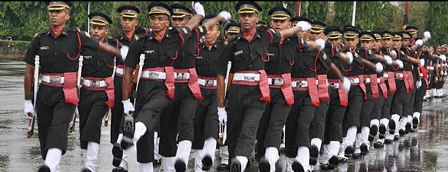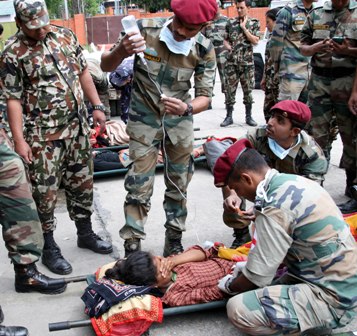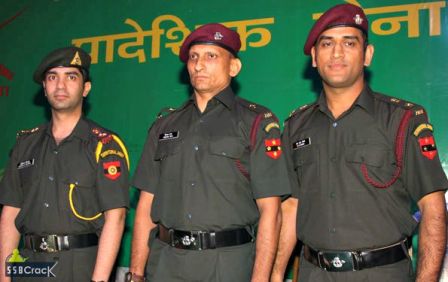
Indian Army
A career in the Indian Army can be a highly rewarding and honorable path for individuals who are dedicated, physically fit, and committed to serving their country. The Indian Army offers a wide range of opportunities and roles for both men and women. It's important to note that the Indian Army is organized into various branches and units, each with its own specialized roles and responsibilities. Additionally, the specific duties of an individual soldier can vary based on their rank, training, and the operational context in which they are deployed. Army personnel are expected to uphold the highest standards of discipline, professionalism, and dedication to their duties to ensure the security and well-being of the nation.
Before pursuing a career in the Indian Army, it's essential to research and understand the specific requirements and responsibilities associated with the role you are interested in. It's also advisable to seek guidance from career counselors and current or former army personnel to make an informed decision. It's crucial to regularly check the official Indian Army website and recruitment notifications for the most up-to-date information on educational qualifications and eligibility criteria for the specific entry point or branch you are interested in.
Role Desciption
The roles and responsibilities of Indian Army personnel can vary depending on their rank, specialization, and the specific unit or branch they serve in. However, here are some general roles and responsibilities that apply to most Indian Army personnel:
- Defending the Nation: The primary duty of Indian Army personnel is to defend the country's sovereignty and territorial integrity. This includes safeguarding the borders from external threats and ensuring national security.
- Combat Operations: Army personnel may be involved in combat operations during times of conflict or war. This can include ground warfare, air defense, and counterinsurgency operations.
- Counterterrorism and Counterinsurgency: In areas affected by terrorism or insurgency, the Indian Army plays a crucial role in maintaining law and order, conducting counterterrorism operations, and restoring peace.
- Disaster Relief: Army personnel are often called upon to provide disaster relief during natural disasters such as earthquakes, floods, and cyclones. They assist in rescue operations, providing medical aid, and restoring infrastructure.
- Peacekeeping Missions: Indian Army personnel participate in United Nations peacekeeping missions around the world. Their duties include maintaining peace and stability in conflict-prone regions, monitoring ceasefires, and ensuring humanitarian assistance.
- Border Security: Protecting India's borders, especially in challenging terrain like the Himalayas, is a critical responsibility. This involves patrolling, surveillance, and maintaining a constant vigil.
- Training and Leadership: Senior officers and non-commissioned officers (NCOs) are responsible for training and mentoring junior personnel.
They ensure that soldiers are well-prepared for their duties and uphold discipline and morale within their units.
- Logistics and Support: Behind the frontlines, there are numerous support roles such as logistics, engineering, and medical services. These personnel ensure that the army is adequately supplied, equipped, and medically cared for in the field.
- Technical Specializations: Some army personnel have technical specializations, such as engineers, doctors, nurses, and signal corps, which provides specialized services to the army.
- Maintaining Equipment: Army personnel are responsible for the maintenance and upkeep of their weapons, vehicles, and equipment to ensure operational readiness.
- Intelligence and Reconnaissance: Gathering intelligence on enemy activities and conducting reconnaissance missions to assess threats and terrain is a critical aspect of army operations.
- Community Engagement: In areas where the army is stationed, personnel often engage with local communities, building rapport, providing assistance, and fostering goodwill.
- Disarmament and Demobilization: In post-conflict situations, the army may be involved in disarmament and demobilization efforts, ensuring that former combatants reintegrate into society peacefully.
- Cybersecurity: In the modern era, the Indian Army also has a growing need for personnel skilled in cybersecurity to protect critical information systems.
Eligibility
Route to become an Indian Army officer
- 10+2 with Science Stream and Mathematics (For NDA entry point)
- Graduate with Science or Humanities (For CDS and IMA direct entry)
Significant Statistics
Nationality: You must be an Indian citizen.
Age: The age requirements vary depending on the entry level, so it's essential to check the specific age limits for the role you are interested in.
Educational Qualifications: Educational requirements vary, but typically, you should have at least a 10+2 (Intermediate) qualification for most entry-level positions.
Physical Fitness: The Indian Army has rigorous physical standards, and candidates need to meet specific height, weight, and fitness criteria. You will be required to pass physical fitness tests as part of the selection process.
Entry points
The Indian Army offers various entry points for individuals, depending on your qualifications and preferences. Some common entry points include:
- National Defence Academy (NDA) to join the Army wing for 10+2 candidates.
- Combined Defence Services (CDS) examination for graduates.
- Indian Military Academy (IMA) for those who have completed their graduation.
- Technical Entry Scheme (TES) for candidates with a background in engineering after 12th with Physics, Chemistry and Mathematics with a rank in JEE exam.
- Short Service Commission (SSC) for various specialized roles.
- Territorial Army for part-time service.
- Indian Army Education Corps (AEC) to serve as Education Officers after post graduation
- Judge Advocate General (JAG) Branch after having a LLB degree and registration with the Bar Council of India.
- Army Medical Corps (AMC) to become a doctor after clearing Army medical entrance exams (AFMC) after 12th class
- Army Dental Corps (ADC) to become a dentist in army hospitals after clearing Army medical entrance exams after 12th class
Once you identify the entry point that suits you, you need to apply for the respective exams or courses. The selection process typically includes a written examination, a physical fitness test, an interview, and medical examinations. You will be tested on various aspects such as leadership skills, physical endurance, and aptitude.
If you successfully clear the selection process, you will undergo training at one of the Indian Army's training academies. The length and nature of training depend on the entry point and the role you are selected for. The Indian Military Academy, Officers Training Academy, and other institutions provide world-class training to candidates.
Pros/Cons
Pros:
- Patriotism and Service: Serving in the Indian Army allows you to serve your country and protect its sovereignty, which can be a source of great pride and satisfaction.
- Job Security: The Indian Army offers job security, including a guaranteed salary, allowances, and benefits. It's a stable career option.
- Training and Discipline: The army provides rigorous training that instills discipline, leadership skills, and physical fitness. This training can be valuable both within and outside the military.
- Healthcare: Army personnel and their families receive access to comprehensive healthcare facilities.
- Educational Opportunities: The Indian Army offers educational opportunities, including financial support for further studies and opportunities to pursue specialized courses.
- Travel and Adventure: Depending on your posting, you may have the chance to travel to various parts of India and even serve in international peacekeeping missions, providing exposure to different cultures and experiences.
- Comradeship: You develop strong bonds with your fellow soldiers, fostering a sense of camaraderie and teamwork.
- Retirement Benefits: The Indian Army provides pension and retirement benefits, ensuring financial security after retirement.
Cons:
- High Risk: Military service involves inherent risks, including the possibility of combat deployment and exposure to danger. This can lead to physical and psychological stress.
- Long Separations: Army personnel often spend extended periods away from their families, which can strain personal relationships.
- Challenging Living Conditions: Depending on your posting, you may have to endure harsh living conditions, including extreme weather, remote locations, and limited amenities.
- Strict Discipline: The military enforces strict discipline, which can be challenging for individuals who prefer a more relaxed work environment.
- Limited Personal Freedom: The army can dictate many aspects of your life, from your appearance to your daily routine, which may not suit everyone's preferences.
- Transfers: Frequent transfers are common in the military, which can disrupt family life and stability.
- Physical Demands: The physical demands of military service can be intense, and soldiers are required to maintain high levels of physical fitness.
- Limited Career Options Outside the Military: Some specialized skills acquired in the military may not be directly transferable to civilian jobs, limiting career options upon retirement.
Leading Professions
View All
Combat Arms
Infantry officers lead a...
30.0LPA

Technical Branches
Engineering Services bra...
30.0LPA

Support Services
Medical Corps branch off...
24.0LPA

Logistics and Supply
Ordnance Corps officers ...
16.0LPA

Intelligence and Security
Military Intelligence (M...
18.0LPA

Legal Services
Judge Advocate General (...
24.0LPA

Special Forces
Special Forces (Para SF)...
30.0LPA

Territorial Army (TA)
The Territorial Army off...
28.0LPA
CAREER VIDEOS
Career Path
10+2 with Science Stream and Mathematics (For NDA entry point)
1 Steps
Skills
Recruitment Area
Northern Command ,
Western Command ,
Southern Command ,
South Western Command ,
Eastern Command ,
Central Command ,
Army Recruitment Offices ,
Territorial Army ,
Specialized Entry Schemes .
Recruiters
Indian Army's Recruiting Directorate ,
Union Public Service Commission (UPSC) ,
Army Recruiting Offices (AROs) ,
Indian Military Academy (IMA) ,
Officers Training Academy (OTA) .
Explore Colleges
Exams & Tests
Interested? Take the next step for this career
10+2 with Science Stream and Mathematics (For NDA entry point)
- 1 Steps
Skills Needed
Exams and Tests
Recruitment Area
Northern Command ,
Western Command ,
Southern Command ,
South Western Command ,
Eastern Command ,
Central Command ,
Army Recruitment Offices ,
Territorial Army ,
Specialized Entry Schemes .
Recruiters
Indian Army's Recruiting Directorate ,
Union Public Service Commission (UPSC) ,
Army Recruiting Offices (AROs) ,
Indian Military Academy (IMA) ,
Officers Training Academy (OTA) .



















